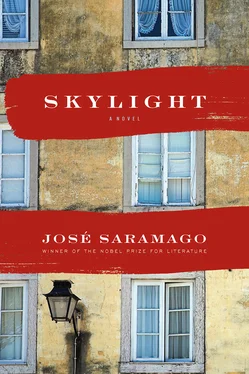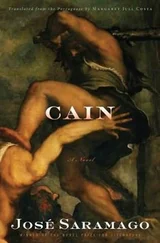“Not in this case. If I’d never come to live here, this might never have happened.”
“Possibly. But if the person who wrote the letter was determined to write it, he or she would have found some other way. It could just as easily have been someone else.”
“You’re right. But it happened to be me!”
“Yes, you of all people, when you’ve always been so careful to cut off all tentacles!”
“Don’t joke.”
“I’m not joking. Cutting off tentacles isn’t enough. You’ll be leaving tomorrow. You’ll disappear and cut off the tentacle, but the tentacle will still be here, in my friendship for you, in the change in Dona Lídia’s life.”
“That’s what I meant when I said that the mere fact of existing can be a bad thing.”
“Well, for me it was a good thing. I met you and we became friends.”
“And what did you gain from that?”
“A friendship. Or don’t you think friendship is that important?”
“Of course I do.”
Silvestre said nothing. He drew a chair closer to the bed and sat down. He took his tobacco pouch and cigarette papers out of his vest pocket and rolled himself a cigarette. He looked at Abel through the ensuing cloud of smoke and said softly, as if he were joking:
“Your problem, Abel, is that you have no love.”
“I’m your friend, aren’t I, and friendship is a form of love.”
“Agreed.”
There was another silence, during which Silvestre did not take his eyes off Abel.
“What are you thinking?” asked Abel.
“About our old arguments.”
“I don’t see the connection.”
“Everything connects with everything else. When I said your problem was that you had no love, you assumed I was referring to love for a woman, didn’t you?”
“Yes, I did. I’ve fancied lots of women, but never loved one. I must be dead inside.”
Silvestre smiled:
“What, at twenty-eight? Don’t make me laugh! Wait till you’re my age.”
“All right. Anyway, were you or were you not referring to love for a woman?”
“No.”
“So?”
“I meant a different kind of love. When you’re walking down the street, have you never felt a sudden desire to embrace the people around you?”
“If I was trying to be funny, I’d say yes, but only the women, and not all of them either. But wait, don’t get annoyed. No, I’ve never felt such a desire.”
“Well, that’s the love I’m talking about.”
Intrigued, Abel propped himself up on his elbows and looked at Silvestre:
“You’d make an excellent apostle, you know.”
“I don’t believe in God, if that’s what you mean. Maybe you think I’m an old sentimentalist…”
“Not at all!”
“Maybe you think it’s just old age speaking. Well, in that case, I’ve always been old. I’ve always thought and felt the same. And if there’s one thing I do believe in, it’s love, that kind of love.”
“It’s wonderful to hear you say that, but it’s pure utopianism. And contradictory too. Didn’t you say earlier on that life was a dung heap, a steaming dung heap?”
“It is, but life is like that because certain people wanted it to be, people who had, and still have, their disciples.”
Abel sat up on the bed. The conversation was beginning to interest him:
“Would you want to embrace them too?”
“I’m not as sentimental as that. How could I love the very people who are responsible for the lack of love between others?”
These words, so laden with meaning, reminded Abel of someone else’s words:
“Pas de liberté pour les ennemis de la liberté.”
“I didn’t understand. It sounds like French, but I didn’t understand…”
“It’s something Saint-Just said, one of the leaders of the French Revolution. It means, more or less, that there should be no freedom for the enemies of freedom. Applying it to our conversation, you could translate it as: we should hate the enemies of love.”
“He was quite right, that Monsieur…”
“Saint-Just.”
“Yes, him. Don’t you agree?”
“About what Saint-Just said or about everything else?”
“Both.”
Abel seemed to retreat into thought. Then he said:
“I agree with Saint-Just, but as for the rest, no, I’ve never met anyone I could love like that. And I’ve met a lot of people. They’re all as bad as each other. I may have found an exception in you, not because of what you’ve just been telling me, but because of what I know about you and your life. I understand that you can feel that kind of love, but I can’t. I’ve taken a lot of knocks in life, I’ve suffered. I certainly wouldn’t do what that other fellow did, and turn the other cheek…”
Silvestre said vehemently:
“Neither would I. I’d cut off the hand of anyone who hit me.”
“If everyone did that, there’d be no two-handed people left in the world. If someone takes a beating, they’re sure to beat up someone else one day, if they haven’t done so already. It’s all a question of opportunity.”
“That way of thinking is called pessimism, and people who think like that are only helping those who want to spread a lack of love among ordinary people.”
“Forgive me, but like I said, what you’re proposing is pure utopianism. Life is a fight to the death, always and everywhere. It’s a case of every man for himself. Love is the cry of the weak, hatred is the weapon of the strong. Hatred for their rivals and competitors, for those contending for the same piece of bread or land or the same oil well. Love is either just a joke or something that gives the strong a chance to make fun of the weakness of the weak. For them, the existence of the weak is useful as a pastime, an escape valve.”
Silvestre appeared not to think much of the comparison. He looked at Abel very seriously, then smiled and asked:
“And are you one of the strong or one of the weak?”
Abel felt he had been caught out:
“Me? That’s hardly a fair question.”
“I’ll help you. If you’re one of the strong, why don’t you do as they do? If you’re one of the weak, why don’t you do as I do?”
“Don’t look so pleased with yourself. Like I said, it’s not a fair question.”
“Well, answer it anyway!”
“I can’t. Perhaps there’s some halfway house. On the one side, the strong, on the other, the weak, and in the middle, me and all the others.”
Silvestre stopped smiling. He looked hard at Abel and said slowly, counting off each statement on his fingers:
“All right, I’ll answer for you. You don’t know what you want, you don’t know where you’re going, and you don’t know what you have.”
“In short, I know nothing.”
“Don’t make a joke of it. What I’m saying is very important. When, some time ago, I said that you needed to—”
“I know, to be useful,” broke in Abel impatiently.
“When I said that, I had no idea you would be leaving us so soon. I also said that I couldn’t give you any advice, and I say the same now. But you’re leaving tomorrow and we might never see each other again. I decided that, even if I can’t advise you, I can at least tell you that a life without love, a life like the one you described just now, isn’t life at all, it’s a dung heap, a sewer.”
Abel stood up impulsively:
“Indeed it is, but what are we going to do about it?”
“Change it!” answered Silvestre, also springing to his feet.
“How? By loving each other?”
Abel’s smile vanished when he saw Silvestre’s grave expression:
“Yes, but loving each other with a lucid, active love, a love that can overcome hatred!”
“But man…”
“Listen, Abel, when you say the word ‘man,’ think ‘men.’ Man, with a capital M, as I sometimes read in the newspapers, is a lie, a lie that serves as a cover for all kinds of villainy. Everyone wants to save Man, but no one wants to know about men.”
Читать дальше












